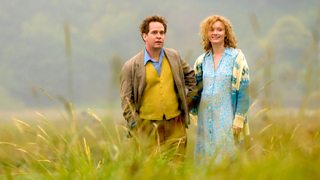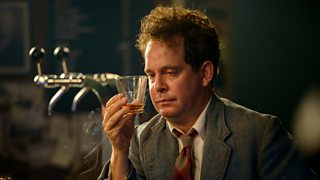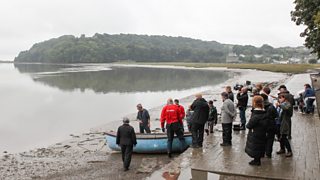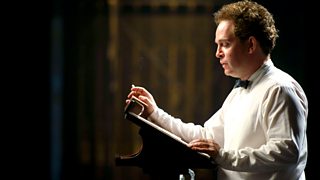Editor's note: is broadcast on Â鶹ԼÅÄ Two on Sunday 18th May 2014 at 9pm and on Â鶹ԼÅÄ iPlayer for 7 days. It is part of the

Tom Hollander and Essie Davis (credit Â鶹ԼÅÄ/Modern Television)
How did you come to write A Poet In New York?Ìý
It’s quite simple really; (Rhys Jones) approached me. He’d originally planned to do a documentary about but the Â鶹ԼÅÄ, when he suggested it, said why not do a drama? So he thought of me to write it which was great for me. In a way I’m surprised I didn’t think of it myself. When I was growing up as a kid in school Dylan was very much of an inspiration to me because we both grew up in South Wales and of a similar background - him in Swansea and me in Cardiff. Both our fathers were teachers. Both of us had an interest in, I guess, being outrageous and chasing girls and writing poetry. I find so much in common with him the more I read of his, especially reading his short stories. There hadn’t been any writers in my family before so I thought it a weird and crazy idea to want to be a writer, but Dylan Thomas’s example really gave me hope. I thought if he could do it maybe I could - with less distinction and turned out to be in a different field in the end - but I still feel a lot in common with him in a way.
Andrew Davies reflects on how Dylan Thomas's life and work inspired him to be a writer.
Is it harder to write a drama portraying real life?Ìý
Not necessarily. There’s an awful lot of material to draw from. I read about 20 books altogether and I tended to find that I trusted the books by the people who’d actually known him personally and been with him at the time. I’d read so much of his work that I thought I’d developed quite a good feel for how he talked and how he sounded. In a lot of ways, it is more difficult than adapting a novel, especially a good novel that’s got good dialogue in it. But it was actually great, I really enjoyed doing this. I felt a bit anxious, I felt a responsibility to him and to all the people in Wales who are his great fans and people all over the world who are his fans. I wanted to do justice to it and do it as well as I could. I felt my instinct seemed to guide me on how much of this or that to put into it and it flowed quite fluidly from the poet to the childhood, back to New York, and to and so on.

Tom Hollander stars as Dylan Thomas in A Poet in New York
How important was it to find the right person to play Dylan Thomas?Ìý
It was a big thing really, it all depended on who we got to play him and whether he could be believable and sympathetic. We were flailing around a bit with ideas but as soon as somebody suggested I thought immediately yes that does it! There’s quite a physical resemblance, and Tom has a particular quality of not just being a terrific actor and a great impersonator as it were, but he’s got this kind of charm and lovability about him that shines right through. So I knew he’d be able to find a way of showing how drunk, ill, disgusting-looking etcetera Dylan got. He’d be able to make it look both believable and loveable. And he did. It’s a really terrific performance.

The crew on location in Laugharne.
Dylan’s granddaughter Hannah Ellis was involved from very early on. What was that like?Ìý
She was, and she’s very much the guardian of her grandfather’s flame. She was concerned that it would concentrate on the, I suppose ‘dirtier’ side of his life, although I wanted to make clear what kind of things he got up to. I wanted it to keep the audience’s sympathy all the way through and to feel for him, because he was in a desperate situation towards the end, with his marriage imploding and various financial troubles and fears about whether his poet gift has deserted him. Hannah felt ok about it. She read all the drafts and we met and talked about it.

The last days of a great poet.
Why did you decide to cover this period of Dylan’s life?
It’s always a good idea with a biopic to concentrate on a particular period and flash back or flash forward, and the last week of his life was very significant. At the beginning, when I was discussing it with Griff, he was very interested and thought maybe we should concentrate on what killed Dylan Thomas, . Or was it mysterious? There had been several books written to prove that he died of the fatal injection, or misdiagnosed diabetes. Obviously that was interesting to me but I thought it was a bit of a shame doing a film about Dylan Thomas and not celebrating his life as a whole and celebrating his poetry and his relationship with Caitlin. I wanted to do all those things because we wouldn’t be writing about him at all if it hadn’t been for his wonderful poetry. I wanted to make sure the focus was more on that than on the rather seedy circumstances in which he died. So that’s what I did - working from the last week of his life and flashing back to his childhood and to earlier happier days with Caitlin.
- visit the programme's webpageÌýfor more interviews, photos and clips
(This interview was originally published on the Â鶹ԼÅÄ's Media Centre website)
